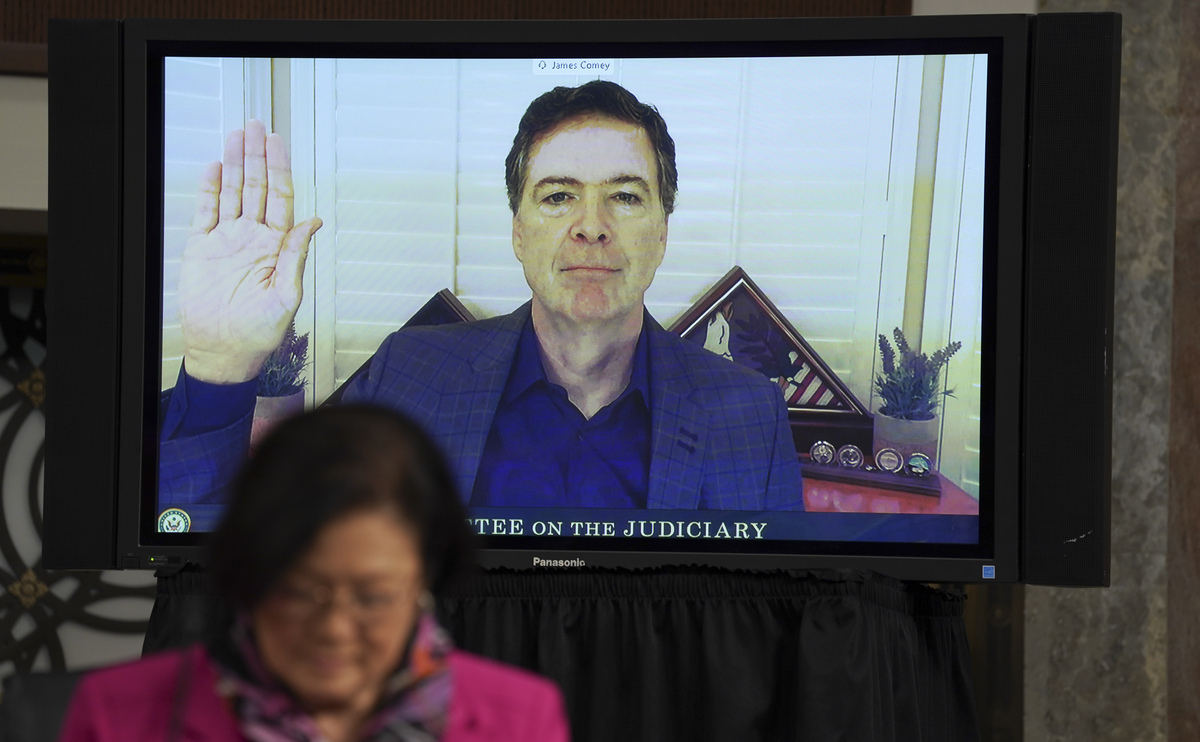
Chairman of the Senate Judiciary Committee Sen. Lindsey Graham, R-S.C., holds a hearing on Wednesday on the FBI's investigation of the 2016 Trump campaign and Russian election interference. Stefani Reynolds/Pool/Getty Images hide caption

Chairman of the Senate Judiciary Committee Sen. Lindsey Graham, R-S.C., holds a hearing on Wednesday on the FBI's investigation of the 2016 Trump campaign and Russian election interference.
Stefani Reynolds/Pool/Getty ImagesUpdated at 1:55 p.m. ET
Former FBI Director James Comey says that if he knew today what he knew during the Russia investigation, he would have taken a more skeptical view about a key surveillance request.
Comey told the Senate Judiciary Committee on Wednesday that the subsequent revelations about problems with the surveillance warrant requested against one ex-junior campaign aide to Donald Trump likely would have given him pause in pursuing it.
Comey agreed with senators that omissions in the FBI and Justice Department applications to the secret court that authorized the surveillance on Carter Page were problematic, and he agreed with how troubling it has been called by critics.
Surveillance requests now involve so much bureaucracy, he said, that responsibility has become "diffuse" among the many participants. The former director said he hopes the FBI and Justice Department will adopt a new system more like those used in criminal wiretaps, in which he said only one attorney and one investigator — such as an FBI special agent — must sign their names and accordingly bear all the accountability for the process.
Overall, however, Comey continued to defend the bulk of the work done by the FBI in the investigation into Russian interference in the 2016 election; he said that he believed it had been properly justified and professionally conducted.

Former FBI Director James Comey is sworn in via videoconference during a Senate Judiciary Committee hearing on Wednesday. Stefani Reynolds/Pool/Getty Images hide caption

Former FBI Director James Comey is sworn in via videoconference during a Senate Judiciary Committee hearing on Wednesday.
Stefani Reynolds/Pool/Getty ImagesThe panel's chairman, Sen. Lindsey Graham, R-S.C., repeated his frustrations about the failures in the Page warrant application process and said he wanted to continue examining that matter until he was satisfied with his findings and accountability: "Somebody needs to go to jail or get fired over that," he said.
Novel attack involving unproven allegations
For as familiar as many of the themes were on Wednesday, Graham's hearing included one major novel tactic: He alluded to new, unverified material surfaced from within the intelligence community by Republicans' political ally, Director of National Intelligence John Ratcliffe.
The chairman did not spend as much energy defending the merits of that reporting as much as he attempted to cite it as an example of what he called biased treatment by the FBI under Comey: When suspicions arose tying Trump's camp to Russia's attack on the 2016 election, investigators pursued that fervently, he argued; when other allegations arose as contained Ratcliffe's unsubstantiated material, Graham said, the FBI wasn't interested.
"I'm beginning to understand there was a two-tiered system here," he argued.
One reason likely is that the unverified material was rejected by officials, as it was later rejected for consideration by the Republican-led Senate Intelligence Committee. The chairman's point was more about what he called the arbitrariness involved than about the newly revealed reporting.
Comey did not attempt to litigate the Ratcliffe material and told Graham he didn't remember it coming to his attention during the time he was directing the bureau. In reading Ratcliffe's letter surfacing the material now, Comey said he didn't understand it.
Ratcliffe said in a brief statement on Tuesday that the material hasn't been assessed as Russian disinformation, as some critics have called it, but the details aren't clear. The director said he would brief members of Congress about it but Graham said on Wednesday he hadn't received any presentation so far.
Critics, meanwhile, have howled at what they called the cynicism associated with a political spymaster, in Ratcliffe, using his access to secret and unconfirmed material to supply it to Graham for the purposes of what Democrats called a political hearing on Wednesday.
"I hope nobody on this committee had any hand in the generation on this letter," said Sen. Sheldon Whitehouse, D-R.I. "If we had any hand in this, that's a real problem ... this is something that got spun up by a political appointee. This rings just innumerable bells about the dangers of selective classification."
The Link LonkSeptember 30, 2020 at 05:52PM
https://ift.tt/33dhgcS
James Comey Admits Problems With Carter Page Surveillance - NPR
https://ift.tt/3d5QSDO



No comments:
Post a Comment